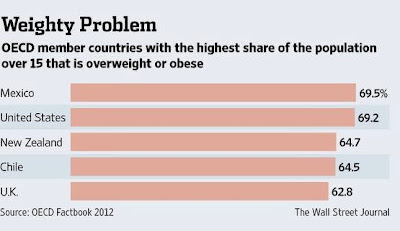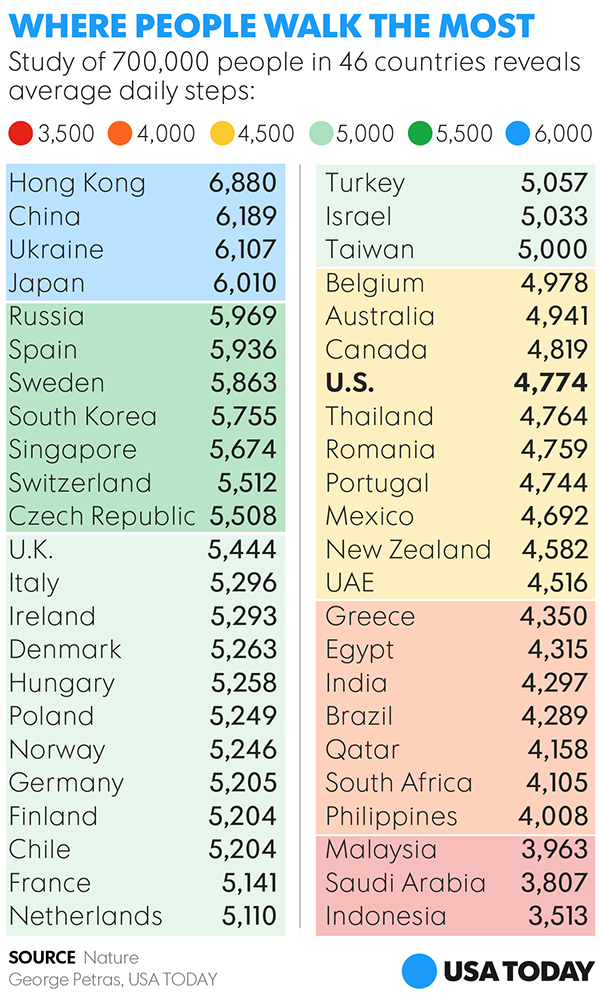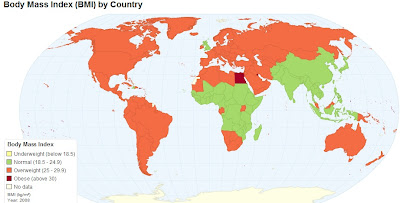PakAlumni Worldwide: The Global Social Network
The Global Social Network
World's Population and Impact of Obesity on Planet Earth
As the West frets about population growth in the developing world on World Population Day today, it's also important to understand the impact of growing obesity on the planet.
Asia has 61 per cent of the world's population but only 13 per cent of the world's weight. In contrast, Americans make up only five per cent of the world's population but account for a third of the world's weight due to obesity, according to a recently published research paper.
The researchers calculated the average global body weight at 137 pounds, but in North America the average was 178 pounds, while in Asia it was 57.7kg (127lb). In their report, the researchers from the London School of Hygiene and Tropical Medicine worked out the weight of the global population at 287 million tonnes.
They estimate that 15 million tons of this mass is due to people being
overweight, and 3.5 million tons due to obesity.
The researchers found that Americans and Arabs are among the heaviest while Asians and sub-Saharan Africans are the lightest in weight. It takes only 12.2 Americans to add up to a ton of weight while it takes 20.2 Bangladeshis to equal a ton of weight. The top ten heaviest include US (12.2) , Kuwait (12.19), Croatia (13.1), Qatar (13.0), Egypt (13.5), UAE (13.2), Trinidad & Tobago (13.8), Argentina (13.8), Greece (13.3) and Bahrain (13.6). The lightest include North Korea (19.0), Cambodia (17.9), Burundi (18.5), Nepal (19.8), Congo (18.7), Bangladesh (20.2), Sri Lanka (19.8), Ethiopia (18.9), Vietnam (19.7) and Eritrea (19.2). Indians and Pakistanis do not show up in either of the two groups.
In terms of average BMI (Body Mass Index), Pakistanis and Chinese are at 23, Indians 21 and Bangladeshis 20.5, all within normal range of 18.5 to 24.9. The average values of BMI for Europe, Middle East and North and South America are much higher.
One of the authors of the paper, Professor Ian Roberts, told the BBC:
"When people think about environmental sustainability, they immediately
focus on population. Actually, when it comes down to it, it’s not how
many mouths there are to feed, it is how much flesh there is on the
planet." "If every country in the world had the same level of
fatness that we see in the USA, in weight terms that would be like an
extra billion people of world average body mass," he added.
 |
| Source: Wall Street Journal |
“We do not move our bodies so much but we are biologically programmed to eat,” Roberts told the Daily Telegraph.
"We often point the finger at poor women in Africa having too many
babies. But we've also got to think of this fatness thing; it's part of
the same issue of exceeding our planetary limits."
Americans are beginning to recognize and respond to the obesity epidemic by promoting healthier alternatives to fattening fast foods in school lunches and by encouraging greater physical activity. Unfortunately, Asians are moving in the opposite direction. Recent launch of Fatburger chain of restaurants in Pakistan is just one symptom of the rapid growth of American sugared drinks and fast food in Asian nations.
Given the fact that South Asians are known to be genetically predisposed to obesity-related diseases like diabetes and heart diseases, the growth of American fast food in Asia could spell disaster. It's time for the local health officials to start tackling obesity before it becomes an epidemic further straining the already inadequate and overburdened health care systems in India and Pakistan.
Here's a video of a recent TV discussion on population:
Related Links:
Haq's Musings
India's Rising Population & Depleting Resources
Music Drives Coke Sales in Pakistan
FMCG Consumption Boom in Pakistan
Disease Burdens in India and Pakistan
Health Risks Rising- Bunge in Pakistan
-
Comment by Riaz Haq on October 18, 2013 at 9:31am
-
Here's a WSJ report on Mexican surpassing US in obesity:
MEXICO CITY—Congress's lower house of Congress passed late Thursday a special tax on junk food that is seen as potentially the broadest of its kind, part of an ambitious Mexican government effort to contain runaway rates of obesity and diabetes.
The House passed the proposed measure to charge a 5% tax on packaged food that contains 275 calories or more per 100 grams, on grounds that such high-calorie items typically contain large amounts of salt and sugar and few essential nutrients.
The tax, which was proposed just this week, is sure to stir controversy among big Mexican and foreign food companies that operate here. It comes on top of another planned levy on sugary soft drinks of 1 peso (8 U.S. cents) per liter that was passed by the same committee, an effort that New York Mayor Michael Bloomberg supported.
Enlarge Image
The taxes—both aimed at curbing consumption—have broad political support and were expected to later be approved by the Senate as part of a sweeping tax overhaul. The snack food levy is part of a bigger tax proposal from President Enrique Peña Nieto which aims to raise the government's non-oil tax collections.
The taxes would put Mexico, a country notorious for its love of sweets, fried foods and pastries, on the cutting edge of government efforts to cut obesity rates.
"This appears to be the most aggressive strategy anywhere in the world in recent years to improve diets via tax disincentives," said Michael Jacobson, executive director of the Center for Science in the Public Interest in Washington.
Harold Goldstein, executive director of the California Center for Public Health Advocacy, called Mexico a role model, saying that the measures could protect the health of consumers while also shielding the economy from productivity losses and runaway public health costs.
Seven of 10 adults in Mexico, and a third of children, are either overweight or obese. Mexicans have now surpassed Americans for the title of the fattest country in the OECD, according to the organization.
Enlarge Image
A Mexico City street food vendor selling packaged items Thursday. Laurence Iliff
All that fat has contributed to an alarming rise in chronic illnesses like adult-onset Type 2 diabetes, which afflicts an estimated 15% of Mexicans over the age of 20, the highest rate for any country with more than 100 million inhabitants. Illnesses related to excess weight cost the Mexican public health system more than $3 billion a year, according to the legislation.
On virtually every street corner in Mexico, makeshift stands sell the types of packaged items that will be taxed for the first time: potato chips, cookies, ice cream, fried corn chips, chocolates, candy, puddings and local sweets.
"We're a country of malnourished fatsos," José Antonio Álvarez Lima, a former state governor turned newspaper columnist told Mexican political news website Animal Politico. He pegged part of the blame for Mexico's high consumption of soda and snacks on incessant TV advertisements and poor education.
Mexico is Latin America's biggest consumer per-capita of sweet and savory snacks, and the world's top consumer of pastries, according to Euromonitor International, a consultancy.
Those habits have helped turn Mexico City-based Grupo Bimbo, the owner of U.S. brand Sara Lee, into a global leader in packaged foods. The country is also an enormous source of revenue for processed snack-making multinationals like PepsiCo Inc., owner of the popular Mexican potato chip maker Sabritas. Neither company responded to requests for comment.
-------http://online.wsj.com/news/articles/SB10001424052702304864504579141...
-
Comment by Riaz Haq on May 29, 2014 at 4:43pm
-
#Pakistan 9th most obese country: #America at top, #China 2nd, #India 3rd in obese population Study http://tribune.com.pk/story/714845/pakistan-9th-most-obese-country-... … via @etribune
China and India, with much larger populations, trailed 2nd and 3rd in the top 10 obese countries with 46 million and 30 million people respectively, followed by Russia, Brazil, Mexico, Egypt, Germany, Pakistan and Indonesia.
http://www.thelancet.com/journals/lancet/article/PIIS0140-6736(14)60460-8/fulltext
-
Comment by Riaz Haq on June 21, 2015 at 4:08pm
-
Poor Sanitation in India May Afflict Well-Fed Children With Malnutrition
So why was Vivek malnourished?
It is a question being asked about children across India, where a long economic boom has done little to reduce the vast number of children who are malnourished and stunted, leaving them with mental and physical deficits that will haunt them their entire lives. Now, an emerging body of scientific studies suggest that Vivek and many of the 162 million other children under the age of 5 in the world who are malnourished are suffering less a lack of food than poor sanitation.
Like almost everyone else in their village, Vivek and his family have no toilet, and the district where they live has the highest concentration of people who defecate outdoors. As a result, children are exposed to a bacterial brew that often sickens them, leaving them unable to attain a healthy body weight no matter how much food they eat.
“These children’s bodies divert energy and nutrients away from growth and brain development to prioritize infection-fighting survival,” said Jean Humphrey, a professor of human nutrition at Johns Hopkins Bloomberg School of Public Health. “When this happens during the first two years of life, children become stunted. What’s particularly disturbing is that the lost height and intelligence are permanent.”
http://www.nytimes.com/2014/07/15/world/asia/poor-sanitation-in-ind...
-
Comment by Riaz Haq on July 12, 2017 at 8:44pm
-
#Americans among world's laziest, people in #China and #HongKong among most #active in number of steps per day. https://www.usatoday.com/story/news/health/2017/07/12/u-s-among-wor... …
Many Americans are downright lazy. And it’s making us fat.
That’s among the findings of a study by Stanford University researchers using step-counters installed in most smartphones to track the walking activity of about 700,000 people in 46 countries around the world.
Scott Delp, a professor of bioengineering who co-led the research, told the BBC the “study is 1,000 times larger than any previous study on human movement.”
The least lazy, according to the study published in the journal Nature, are the Chinese, particularly those in Hong Kong, where people averaged 6,880 a steps a day.
The worst nation was nearby Indonesia, where people walked nearly half as much, averaging 3,513 steps a day. The worldwide average is 4,961 steps, with Americans averaging 4,774. (See chart below for full results of the survey.)
Does that mean Indonesians are much more likely to be obese than Americans? No, the researchers say. The key is the variation in the amount of walking.
In countries with less obesity, the Stanford researchers say, people typically walked a similar amount every day. In nations with higher rates of obesity, there were larger gaps between those who walked a lot and those who walked very little.
Among those latter countries is the United States, where “activity inequality” ranks Americans fourth from the bottom overall.
“If you think about some people in a country as ‘activity rich’ and others as ‘activity poor,’ the size of the gap between them is a strong indicator of obesity levels in that society,” Delp told the Stanford news site.
Tim Althoff, who worked on the study, pointed to Sweden, with an average of 5,863 steps, as having one of the smallest activity inequality gaps. “It also had one of the lowest rates of obesity,” he said.
Another factor in activity inequality involved where people live: high-density cities or more suburban settings.Jennifer Hicks, another researcher in the study, told the Stanford news site that they examined three California cities located close to one another – San Francisco, San Jose and Fremont. They found San Francisco held both the highest walkability score and the lowest level of activity inequality.
“In cities that are more walkable, everyone tends to take more daily steps, whether male or female, young or old, healthy weight or obese,” Hicks said.

-
Comment by Riaz Haq on January 5, 2022 at 1:57pm
-
Rising #Diabetes in #Pakistan. Pak ranked 3rd with 33 million cases after #China & #India. In terms of percentage of adults, Pakistan had the highest diabetes prevalence in 2021 at 30.8%, followed by #French #Polynesia (25.2%) and #Kuwait (24.9%) https://p.dw.com/p/455ZZ?maca=en-Twitter-sharing
Health experts in Pakistan have expressed grave concerns over surging cases of diabetes in the South Asian nation, warning that the situation could spiral out of control if the government fails to take immediate action.
A recent report from the International Diabetic Federation (IDF) ranking the world's top countries for number of adults (20–79 years) with diabetes in 2021 has put Pakistan in third place with a total of 33 million, after China and India.
The IDF ranked Pakistan first place for having the highest comparative diabetes prevalence rate in 2021 at 30.8%, followed by French Polynesia (25.2%) and Kuwait (24.9%).
Pakistan is also the country with the highest proportion of deaths under the age of 60 due to diabetes, with 35.5%
The IDF found that a further 11 million adults in Pakistan have Impaired Glucose Tolerance (IGT), which puts them at higher risk of developing type-2 diabetes.
The report noted that more than a quarter (26.9%) of adults living with diabetes in Pakistan are undiagnosed.
The findings made headlines across Pakistani media. Health experts have called on the government to inject more funds into its national health budget to combat the problem.
------------
The Pakistani government is paying attention to the diabetes health crisis, reassures Senator Sana Jamali, a member of the Senate National Health Services, Regulations and Coordination Committee. Islamabad is making efforts to tackle the problem, Jamali told DW.
"The prime minister has recently launched health insurance cards in Punjab, which will go a long way in reducing diabetic cases besides making treatment easy for poor people," she said.
But according to Jamali, the government cannot solve the country's health problem alone.
"Unless people change their lifestyle and dietary habits, this problem will continue to haunt us and millions of more people will suffer from it," she maintained, adding that more awareness of the disease needs to be raised nationwide.
-
Comment by Riaz Haq on January 5, 2022 at 2:26pm
-
#Diabetes was once a problem of the #rich. Now it belongs to the #poor. Over the past decade, diabetes prevalence rose faster in low- and middle-income countries than high-income ones. #India #Pakistan #China https://www.washingtonpost.com/news/to-your-health/wp/2016/04/06/di...
As the global diabetes rate soared over the past quarter-century, the affected population transformed: What was once predominantly a rich-country problem has become one that disproportionately affects poorer countries.
That's one of the many conclusions of the World Health Organization's first global report on the chronic disease. Worldwide, diabetes rates nearly doubled, from 4.7 percent in 1980 to 8.5 percent in 2014. Roughly one in 12 people living in the world today have the disease, which has spread dramatically.
“If we are to make any headway in halting the rise in diabetes, we need to rethink our daily lives: To eat healthily, be physically active, and avoid excessive weight gain,” Dr. Margaret Chan, WHO Director-General, said in a statement. “Even in the poorest settings, governments must ensure that people are able to make these healthy choices and that health systems are able to diagnose and treat people with diabetes.”
Most of the 422 million adults living with diabetes are, in fact, in poorer countries, the WHO found.
The disease has spread unequally, too.
Over the past decade, diabetes prevalence rose faster in low- and middle-income countries than high-income ones.
As the chart below shows, diabetes prevalence in high-income countries rose from just over 5 percent to about 7 percent.
Low-income countries saw rates grow from just over 3 percent to more than 7 percent, overtaking high-income countries for the first time within the past decade.
Comment
Twitter Feed
Live Traffic Feed
Sponsored Links
South Asia Investor Review
Investor Information Blog
Haq's Musings
Riaz Haq's Current Affairs Blog
Please Bookmark This Page!
Blog Posts
IMF Questions Modi's GDP Data: Is India's Economy Half the Size of the Official Claim?
The Indian government reported faster-than-expected GDP growth of 8.2% for the September quarter. It came as a surprise to many economists who were expecting a slowdown based on the recent high-frequency indicators such as consumer goods sales and durable goods production, as well as two-wheeler sales. At the same time, The International Monetary Fund expressed doubts about the Indian government's GDP data. …
ContinuePosted by Riaz Haq on November 30, 2025 at 11:30am — 1 Comment
Retail Investor Growth Driving Pakistan's Bull Market
Pakistan's benchmark index KSE-100 has soared nearly 40% so far in 2025, becoming Asia's best performing market, thanks largely to phenomenal growth of retail investors. About 36,000 new trading accounts in the South Asian country were opened in the September quarter, compared to 23,600 new registrations just three months ago, according to Topline Securities, a brokerage house in Pakistan. Broad and deep participation in capital markets is essential for economic growth and wealth…
ContinuePosted by Riaz Haq on November 24, 2025 at 2:05pm — 2 Comments
© 2025 Created by Riaz Haq.
Powered by
![]()


You need to be a member of PakAlumni Worldwide: The Global Social Network to add comments!
Join PakAlumni Worldwide: The Global Social Network